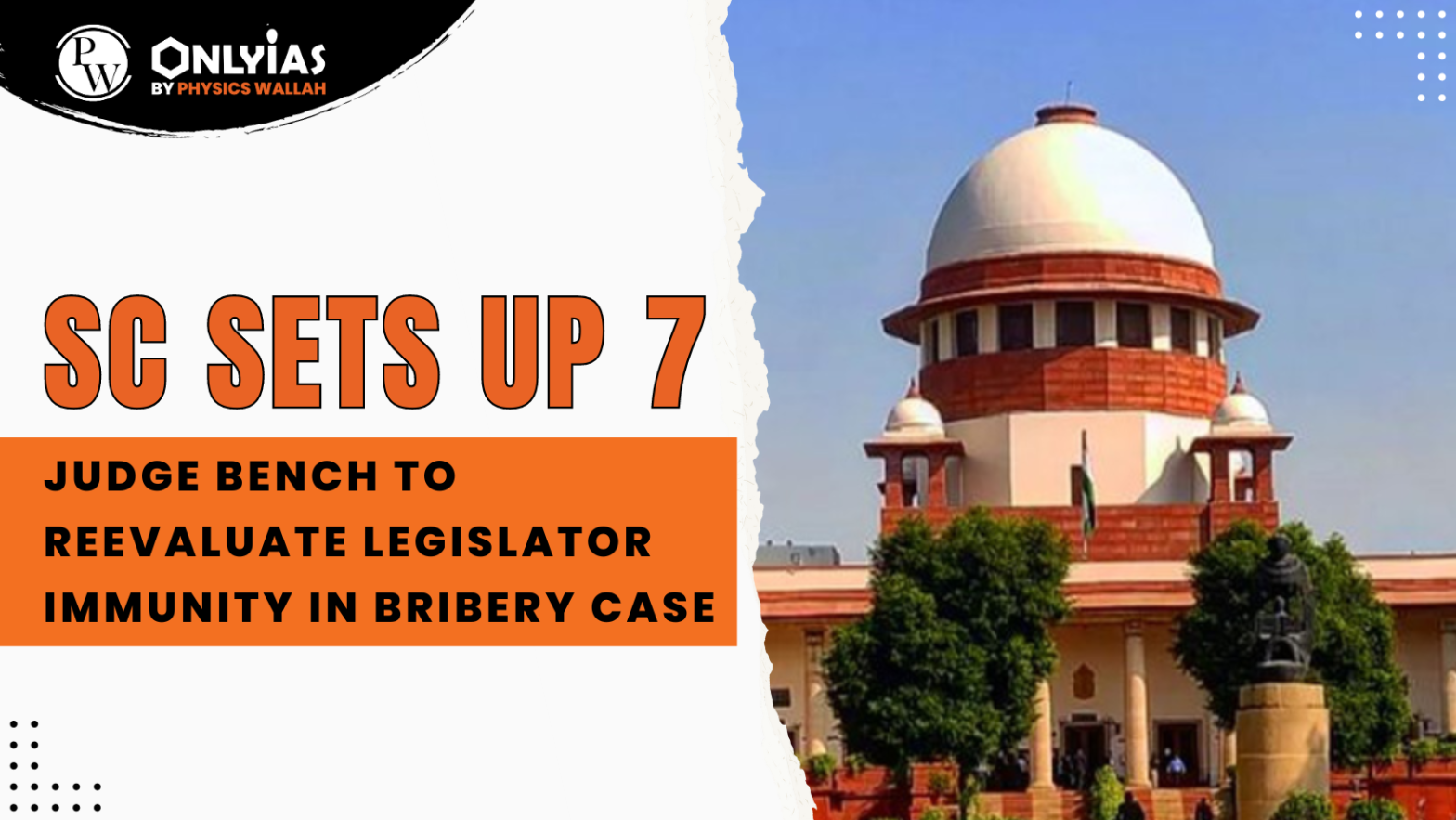Context:
Bribery Charges Spark Constitutional Debate: SC to Reexamine Legislator Immunity
- The question arose in the context of bribery charges against Jharkhand Mukti Morcha (JMM) MLA Sita Soren in connection with the 2012 Rajya Sabha elections to two seats from the state.
- The larger bench would deal with the question of the correctness of the verdict on the interpretation of Articles 105(2) and 194(2) of the Constitution which extends the privilege to a member of Parliament and a member of state legislature, respectively.
- The top court had then said the object of the constitutional provisions under Article 105(2) and Article 194 (2) clearly is not to set apart the members of the legislature as persons who wield higher privileges in terms of immunity from the general criminal law of the land, which citizens of the land do not possess.
The Sita Soren Case: Bribery Charges and Constitutional Immunity
- Sita Soren, a daughter-in-law of JMM chief Sibu Soren, was accused of bribery during the Rajya Sabha elections of 2012 from one R K Agarwal but did not cast a vote in her favour.
- Soren claimed immunity from prosecution under Article 194(2) of the Constitution of India.
- The Jharkhand High Court dismissed Soren’s plea, holding that she could not claim immunity since she had not cast her vote in the manner agreed upon.
- Soren appealed to the Supreme Court against the Jharkhand High Court judgment.
The Bribery Dilemma in the PV Narasimha Rao Case
- A five-judge Constitution Bench of the Supreme Court had in 1998 in PV Narasimha Rao’s case held that a lawmaker was immune to prosecution even if he/she took money to vote on the floor of the House
- However, Two judges on the bench dissented, arguing that this immunity should not apply to cases where bribery is alleged.
- The majority view was that immunity is necessary to protect the independence of parliamentarians and to ensure that they can participate freely in debate.
- The Supreme Court is currently reconsidering the Narasimha Rao judgment, and it is possible that the court will change its position on the immunity of parliamentarians from prosecution for bribery.
Freedom Without Fear: Exploring the Purpose of Immunity for MPs and MLAs
-
- The purpose of these Articles is to ensure that MPs/MLAs are able to discharge their duties in an atmosphere of freedom without fear of consequences that may follow in the manner in which they speak or exercise their vote on the floor of the House.
- Article 105(2) of the Constitution states, “No member of Parliament shall be liable to any proceedings in any court in respect of anything said or any vote given by him in Parliament or any committee thereof.”
- However, Article 194(2) of the Constitution provides similar immunities to State legislatures.
Also read: Election Commission of India (Article 324 to 329)
Bribery and Democracy: Assessing the Impact of Immunity on Accountability
-
- Anomaly: If a person [MP/MLA] accepts a bribery and votes, then there is immunity. If a person accepts the bribery and does not fulfill the bargain by abstaining from the vote or does not give the speech, he or she is liable to be punished.
- Attorney General K K Venugopal said that Narasimha Rao’s judgment does not apply to the facts of the case as the immunity is only for actions with respect to the business of the House.
- Subverting anti-corruption law
- The Supreme Court of India, in (P.V. Narasimha Rao-1998) – has held that MPs and MLAs are public servants and can be prosecuted for offenses under the Prevention of Corruption Act. 1988. The said judgment has been consistently followed and the proposition was reiterated in Abay Singh Chautala -Vs- CBI in 2011.
- Against the Notion of Equality
- The term ‘equality’ means the absence of special privileges to any section of the society, and the provision of adequate opportunities for all individuals without any discrimination.
- Article 14 Of the Constitution seeks to It establish equality before the law and provide equal protection of the law to all.
- Constitutional Morality and Constitutionalism
- The issue of bribery has a significant bearing on the morality of polity which demands transparency and accountability of parliamentarian actions.
Way Forward
- Codification of Privileges
- There is a need for proper codification of privileges, as suggested by the National Commission to Review the Working of the Constitution in its report in 2002.
- For this, India can look into Australia, as the country has codified the privileges and working without much tussle since 1987.
- Prosecution of MPs/MLAs:
- creating a narrow exception for cases of bribery and corruption while keeping Immunity Provisions. This would allow legislators to be prosecuted under general common laws (Prevention of Corruption Act-1988) while protecting their independence.
- Special Tribunal:
- There is a need for a special body to investigate and prosecute allegations of bribery against legislators. This body could be made up of independent judges and experts, and it could be given the power to compel witnesses to testify and to produce evidence.
Conclusion
The Supreme Court’s decision to reevaluate legislator immunity in bribery cases is a significant step towards ensuring transparency and accountability in India’s parliamentary system. The debate surrounding this issue underscores the delicate balance between upholding legislative independence and combating corruption. There are strong arguments on both sides of the issue. It is important to weigh the competing interests carefully and to find a solution that balances the need for legislative independence with the need for accountability.
![]() 26 Sep 2023
26 Sep 2023
